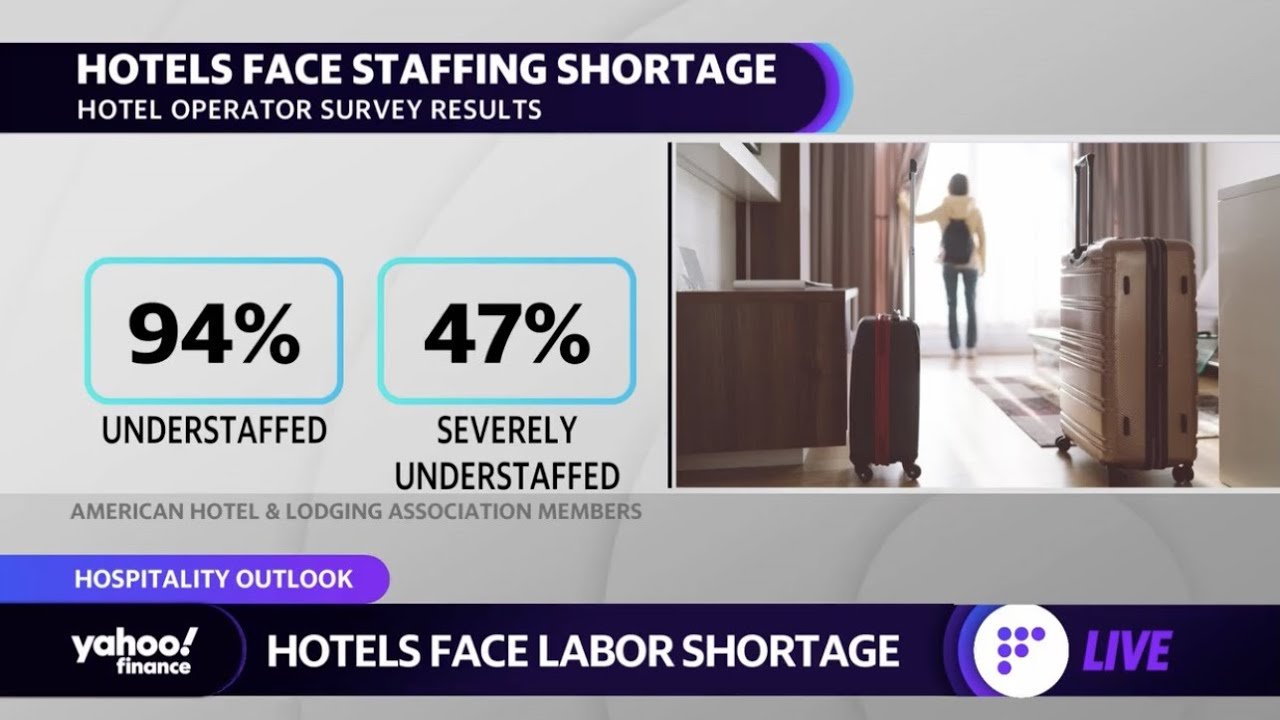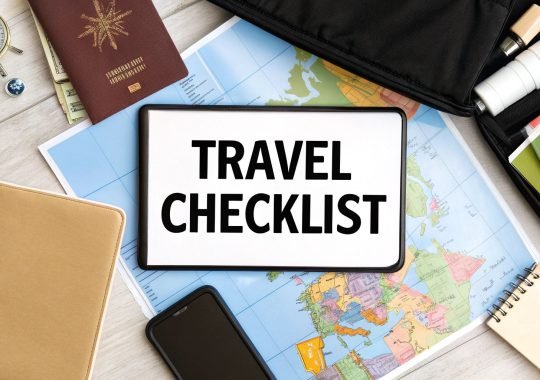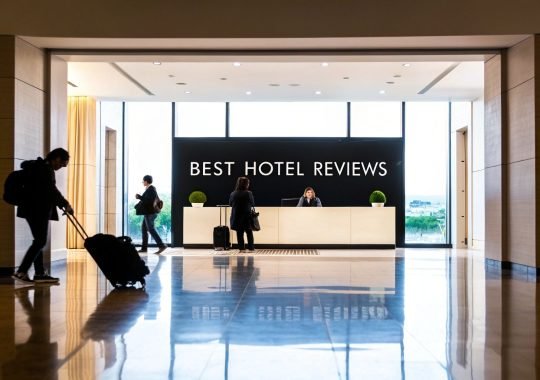The hospitality landscape is evolving at an unprecedented pace, driven by technological leaps, shifting guest expectations, and global economic currents. For hoteliers, staying ahead of these changes isn’t just advantageous; it’s essential for survival and growth. This roundup dives deep into the most critical hotel industry news and trends shaping the market. We’ll move beyond the headlines to provide actionable insights, real-world examples from industry leaders, and practical implementation strategies you can use immediately.
Understanding these pivotal developments is crucial for anyone in the hospitality sector. This article will equip you to enhance guest experiences, optimize operations, and secure your competitive edge in a crowded marketplace. We will explore the seismic shifts occurring in seven key areas, providing a clear roadmap for navigating the challenges and opportunities ahead.
Here’s a look at what we’ll cover:
- AI-Powered Revenue Management: How artificial intelligence is transforming pricing strategies.
- Contactless Technology: The move towards a seamless, mobile-first guest journey.
- Sustainability & Carbon Neutrality: Why green certifications are becoming a commercial imperative.
- Labor Shortages & Automation: Practical solutions to address the ongoing workforce crisis.
- Extended Stays & Workations: Capitalizing on the growing demand for blended travel.
- Hyper-Personalization: Using data and IoT to create unforgettable guest experiences.
- Alternative Accommodations: How hotels are responding to competition from vacation rentals.
Each section breaks down the trend, explains its significance, and offers concrete steps for implementation, ensuring you walk away with a strategic advantage. Let’s examine the forces redefining hospitality.
1. AI-Powered Revenue Management and Dynamic Pricing Revolution
The era of static, season-based room pricing is rapidly ending, replaced by a far more sophisticated and profitable approach. At the forefront of recent hotel industry news is the widespread adoption of AI-powered revenue management and dynamic pricing. This technology moves beyond simple supply-and-demand adjustments, leveraging advanced algorithms to analyze hundreds of data points in real time.
These systems process vast information streams, including competitor pricing, flight booking data, local event schedules, weather forecasts, and even specific guest booking patterns. By understanding these interconnected factors, hotels can optimize room rates multiple times per day, ensuring they capture the maximum possible revenue for every available room. This constant recalibration helps properties capitalize on sudden demand spikes and avoid underselling valuable inventory during peak periods.
Real-World Implementation and Impact
Major hotel groups have already demonstrated the power of this technology. Marriott, for example, utilizes a proprietary AI-powered system across its portfolio of over 7,000 properties to drive revenue strategy. Similarly, IHG Hotels & Resorts partners with specialists like Duetto to implement cloud-based revenue optimization, while Hilton integrates pricing algorithms directly with its in-room technology.
“AI in revenue management isn’t just about raising prices; it’s about precision. It allows us to understand a room’s true market value at any given moment and price it accordingly, enhancing both profitability and competitiveness.” – Revenue Strategy Expert
How to Implement AI-Driven Pricing
Adopting an AI revenue management system requires a strategic approach. It’s not a “set it and forget it” solution but a powerful tool that works best with human oversight.
- Start Small with a Pilot Program: Before a full-scale rollout, test the system on a select group of properties or room types. This allows your team to understand its nuances and measure its direct impact on RevPAR.
- Invest in Staff Training: Ensure your revenue management team is thoroughly trained on interpreting the AI’s recommendations. They need to understand the “why” behind the pricing suggestions to make informed final decisions.
- Establish Clear Pricing Guardrails: Set minimum and maximum pricing boundaries within the system. This prevents extreme rate fluctuations that could damage brand perception or alienate loyal customers.
- Monitor Guest Feedback: Keep a close eye on guest satisfaction scores and online reviews during implementation. Ensure that dynamic pricing strategies are not negatively impacting the guest experience.
For a quick reference, the following summary box visualizes the core benefits and capabilities of these advanced systems.
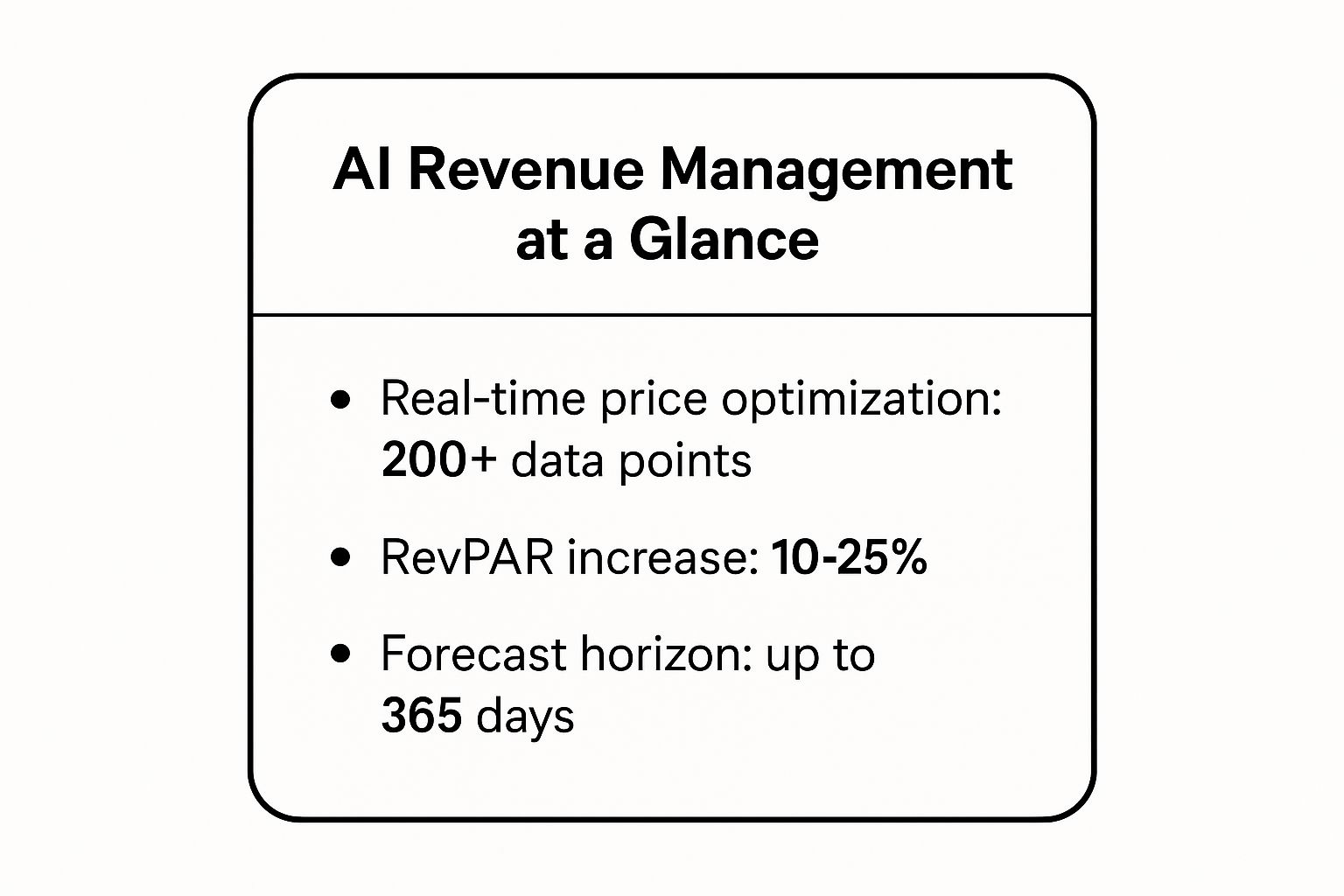
As the data highlights, the ability to analyze over 200 data points in real time can lead to significant RevPAR increases, making this one of the most impactful technological shifts in the hotel industry news landscape. The long-term forecasting capability also empowers hoteliers to build more resilient and forward-looking commercial strategies. This revolution is powered by leading technology firms like IDeaS Revenue Solutions (a SAS company), Duetto, and Revenue Analytics, who continue to innovate in this critical space.
2. Contactless Technology and Mobile-First Guest Experience
The global pandemic acted as a powerful catalyst, but the move toward a mobile-first guest journey was already underway. A major topic in hotel industry news is the permanent adoption of contactless technology, transforming guest interactions from a series of physical touchpoints into a seamless digital experience. This includes mobile check-in and check-out, digital room keys, QR-code-powered menus, and even in-room controls activated by a guest’s smartphone or voice.
This shift is no longer just a safety measure; it has become a guest expectation rooted in convenience and efficiency. Hotels benefit from streamlined operations, reduced front desk congestion, and new opportunities for personalized communication. The guest, in turn, gains control over their stay, bypassing queues and interacting with the hotel on their own terms.
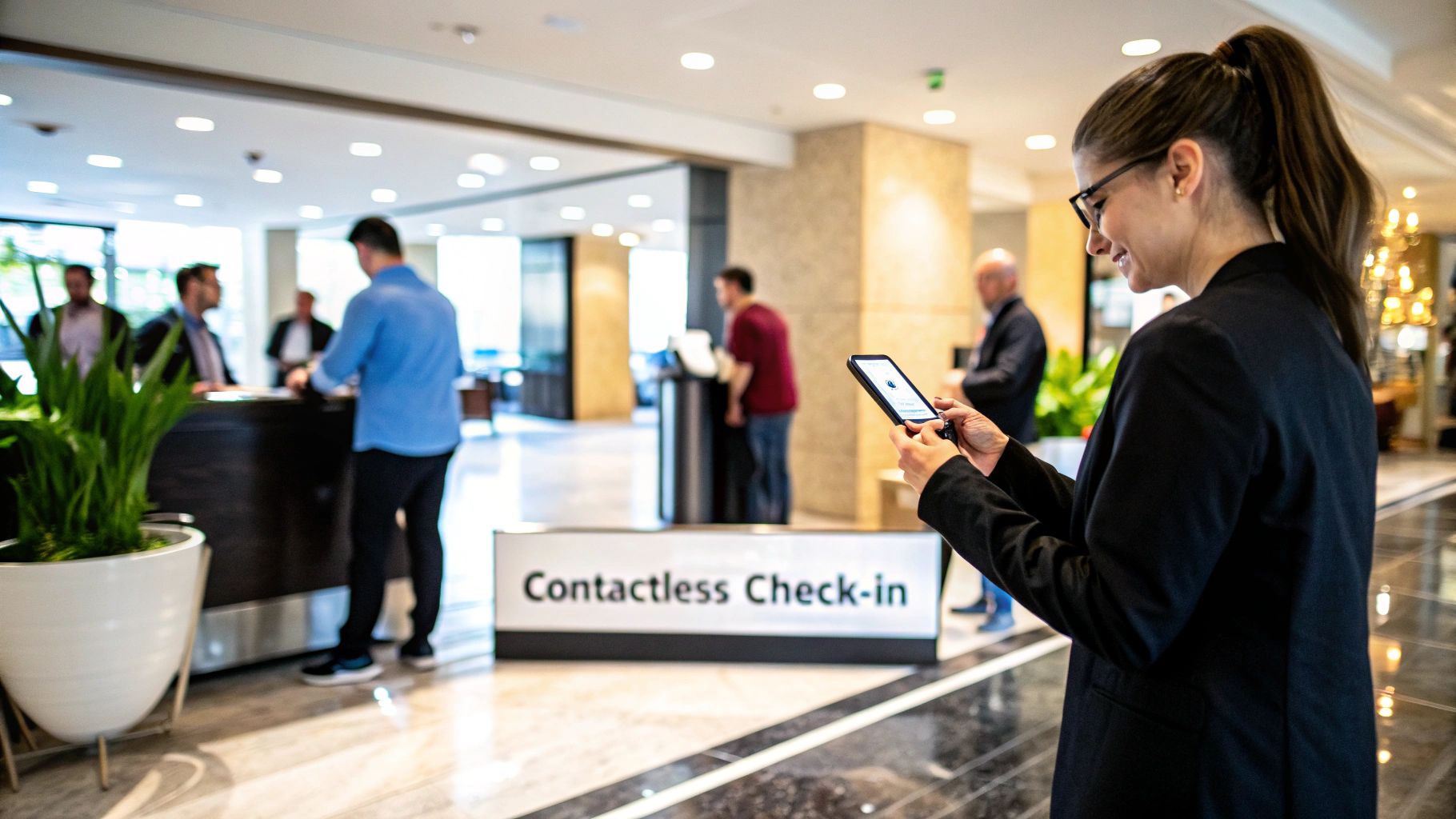
Real-World Implementation and Impact
Leading hotel brands have integrated these technologies portfolio-wide, demonstrating their scalability and guest appeal. Hilton’s Digital Key technology is a prime example, available across its global network and allowing guests to unlock their room and other hotel areas with their phone. Marriott has similarly deployed mobile key access via its Bonvoy app to over 4,000 properties, while Hyatt enhances the experience by allowing guests to select their specific room during mobile check-in.
“The guest journey is now in the palm of their hand. Contactless solutions are about empowering guests with choice and control, which builds loyalty and frees up our staff to focus on higher-value, personalized service interactions.” – Hospitality Technology Consultant
How to Implement a Mobile-First Strategy
Successfully rolling out a contactless guest experience requires more than just new software; it demands a holistic operational strategy. These technologies are fundamentally changing the hotel room and guest interactions.
- Ensure Robust WiFi Infrastructure: A mobile-first strategy is only as good as the network supporting it. Invest in high-speed, property-wide WiFi to prevent connectivity issues that can frustrate guests and disrupt services.
- Train Staff as Tech Ambassadors: Your team should be experts in the mobile technology you offer. Train them not only to use the systems but also to troubleshoot common issues and enthusiastically guide guests through the digital process.
- Provide Non-Digital Alternatives: A seamless experience must be inclusive. Always provide traditional options like physical key cards and front desk check-in for guests who are less tech-savvy or simply prefer it.
- Communicate Options Clearly: Proactively inform guests about your contactless options before they arrive via email or text. Use clear signage and instructions throughout the property to encourage adoption.
This trend is championed by technology providers like ASSA ABLOY Hospitality, OpenKey, and Intelity, who are developing the hardware and software that make this mobile-centric vision a reality. As this technology becomes standard, its effective implementation is a key differentiator in the modern hospitality landscape.
3. Sustainability Certifications and Carbon Neutrality Commitments
The global push for environmental responsibility has become a defining force in recent hotel industry news, with sustainability evolving from a niche interest to a core business imperative. Major hotel groups are now making ambitious, publicly-stated commitments to reduce their carbon footprint, often aiming for complete carbon neutrality by 2030-2050. This involves a multi-faceted strategy that includes achieving prestigious certifications, eliminating waste, and investing in renewable energy.
These initiatives are a direct response to a growing segment of travelers who actively seek out eco-conscious accommodations. By pursuing certifications like LEED (Leadership in Energy and Environmental Design) and Green Key, hotels provide transparent, third-party validation of their green credentials. This not only enhances brand reputation but also meets the increasing demand for responsible travel options, making sustainability a key competitive differentiator.

Real-World Implementation and Impact
The industry’s largest players are leading the charge with comprehensive programs. Hilton’s “Travel with Purpose” platform aims to cut emissions in half by 2030, while Accor has integrated its “Planet 21” program across more than 5,000 hotels, focusing on everything from sustainable food sourcing to eliminating single-use plastics. Marriott International is also on a firm path, targeting a 50% reduction in carbon intensity by 2030 as part of its broader sustainability goals.
“Sustainability is no longer a ‘nice-to-have’ feature; it’s a fundamental expectation from guests, investors, and communities. Hotels that embrace authentic, measurable environmental action are building a more resilient and profitable future.” – Hospitality Sustainability Consultant
How to Implement a Sustainability Strategy
Embarking on a journey toward sustainability can be phased and scalable, allowing properties of all sizes to participate effectively.
- Start with High-Impact, Low-Cost Initiatives: Begin with foundational changes like transitioning to 100% LED lighting, installing low-flow fixtures in bathrooms, and implementing a robust recycling program. These “quick wins” deliver immediate cost savings and environmental benefits.
- Engage Guests in Your Mission: Clearly communicate your sustainability efforts in booking confirmations, in-room materials, and on social media. Invite guests to participate through linen reuse programs or by choosing digital keys, making them partners in your mission.
- Track and Report Progress Publicly: Use utility data and waste audits to establish a baseline and track your progress. Publicly reporting key metrics like energy consumption and waste diversion adds credibility and holds your team accountable.
- Train Staff as Sustainability Ambassadors: Equip your team with knowledge about your property’s green initiatives. Well-informed staff can confidently answer guest questions and encourage participation, turning sustainability into a key part of your service culture.
This trend is championed by globally recognized organizations such as the U.S. Green Building Council (LEED), Green Key International, and EarthCheck. Their frameworks provide the structure and verification needed for hotels to make meaningful environmental progress, a topic that continues to dominate hotel industry news as travelers vote with their wallets for a greener future.
4. Labor Shortage Crisis and Automation Solutions
The post-pandemic labor landscape has created one of the most pressing challenges in recent hotel industry news: a severe and persistent staffing shortage. With turnover rates soaring in many markets, hotels are struggling to fill essential roles, from housekeeping to front desk operations. In response, the industry is accelerating its adoption of automation and robotics, not to replace human workers, but to augment their capabilities and streamline operations.
This strategic shift involves implementing technology to handle repetitive, time-consuming tasks, freeing up human staff to focus on higher-value guest interactions. Beyond technology, properties are also redesigning jobs, offering significantly improved wages and benefits, and exploring innovative staffing models like gig economy partnerships and robust cross-training programs to create a more flexible and resilient workforce.
Real-World Implementation and Impact
The application of automation is no longer theoretical; it’s actively improving efficiency in hotels worldwide. Savioke’s Relay robots, for instance, are now a common sight in over 100 hotels, autonomously delivering amenities, towels, and food orders directly to guest rooms. Similarly, major brands like MGM Resorts have deployed automated check-in kiosks across their Las Vegas properties to reduce front-desk queues, while Aloft Hotels pioneered the use of robotic butlers for room service.
“Automation is our answer to the labor crunch, but it’s also an opportunity. By automating mundane tasks, we empower our team to deliver the personalized, high-touch service that technology can’t replicate. It’s about enhancing the human element, not eliminating it.” – Hotel Operations Director
How to Implement Automation and New Staffing Models
Integrating automation and rethinking labor strategies requires careful planning to ensure a smooth transition for both staff and guests.
- Implement Automation Incrementally: Start with a pilot program for a specific technology, like a delivery robot or check-in kiosk. This allows you to measure guest acceptance and operational impact before a major investment.
- Invest in Comprehensive Staff Retraining: Frame automation as a tool that supports employees. Provide thorough training on how to operate and oversee new systems, and develop new career paths focused on guest relations and technology management. Understanding the range of available roles is crucial, especially when considering the need for skilled labor, as detailed in discussions around diverse hospitality job opportunities.
- Focus on Repetitive Tasks: Target automation for predictable, manual tasks like linen delivery, basic check-ins, or simple data entry. Reserve human interaction for complex problem-solving, personalized recommendations, and creating memorable guest experiences.
- Maintain Human Backup Systems: Technology can fail. Always have contingency plans and human staff ready to step in to prevent service disruptions and maintain guest satisfaction.
The following video showcases how robotic solutions are being integrated into hotel environments to address these very challenges.
As this trend continues to dominate hotel industry news, the successful integration of technology and innovative labor strategies will define the next generation of guest service. This evolution is being led by robotics and automation specialists like Savioke, Bear Robotics, and LG Electronics, who are providing the tools necessary for hotels to thrive in a challenging labor market.
5. Extended Stay and Workation Market Expansion
The traditional lines between work, life, and travel have blurred, creating a seismic shift in guest expectations. A major development in recent hotel industry news is the explosive growth of the extended stay and “workation” market. Fueled by the normalization of remote work, hotels are rapidly adapting to cater to a new breed of traveler: the digital nomad, the remote employee, and the “bleisure” guest who blends business trips with leisure.
This trend goes beyond simply offering weekly rates. It involves a fundamental redesign of spaces and services to support productivity and long-term comfort. Hotels are transforming rooms into hybrid living and working environments, complete with ergonomic seating, dedicated desk space, and guaranteed high-speed Wi-Fi. This strategic pivot allows properties to tap into a lucrative, stable revenue stream that is less dependent on seasonal tourism.
Real-World Implementation and Impact
Pioneering brands have already captured this market with innovative concepts. Selina has built its entire model around a global network of over 100 properties that merge coliving, coworking, and recreational activities. In the mainstream sector, Marriott’s “Work Anywhere” program offers packages with extended stay rates, while Hilton’s “WorkSpaces by Hilton” initiative provides a quiet, professional environment for remote workers needing a day office.
“The workation trend isn’t a fleeting fad; it’s a new standard for a significant portion of the workforce. Hotels that provide a seamless blend of productivity tools and authentic local experiences will build lasting loyalty with this valuable demographic.” – Digital Nomadism Expert
How to Implement Extended Stay and Workation Models
Successfully attracting this segment requires more than just a good Wi-Fi signal. It demands a thoughtful approach to space, community, and flexibility.
- Survey Your Target Demographic: Before renovating, survey potential remote worker guests to understand their specific needs. Do they prioritize a kitchenette, a larger desk, or access to communal lounges?
- Develop Community Programming: Long-term guests crave connection. Organize networking events, local walking tours, or shared meals to foster a sense of community and combat isolation.
- Create Dedicated Booking Channels: Make it easy for guests to find and book long-term stays. Create a specific section on your website for extended stay packages, highlighting the unique amenities and rates. Learn more about the benefits of extended stay hotels.
- Offer Flexible Policies: The nature of remote work can be fluid. Implement flexible cancellation and modification policies to give these guests the confidence to book longer stays without the risk of rigid penalties.
The expansion into the workation market is a critical piece of hotel industry news, representing a strategic move towards more resilient and diversified business models. Brands leading this charge, like Outsite, Remote Year, and WiFi Tribe, have demonstrated that by catering to the needs of modern professionals, hotels can secure higher occupancy rates and cultivate a new generation of loyal, long-term guests.
6. Hyper-Personalization Through Data Analytics and IoT
The modern traveler expects more than just a clean room and comfortable bed; they seek experiences tailored specifically to them. A major headline in recent hotel industry news is the rise of hyper-personalization, driven by the powerful combination of data analytics and the Internet of Things (IoT). This approach uses technology to move beyond basic CRM, anticipating and fulfilling individual guest needs with remarkable precision.
By integrating data from guest profiles, past booking behavior, and in-room IoT sensors, hotels can create a deeply customized stay. This technology can automatically adjust room temperature and lighting to a guest’s known preferences upon check-in, curate in-room entertainment options, and even proactively suggest relevant amenities or local activities. The goal is to make every guest feel uniquely recognized and valued, fostering a stronger sense of loyalty.
Real-World Implementation and Impact
Leading hotel brands are already demonstrating the competitive advantage of hyper-personalization. For instance, W Hotels partnered with Spotify to create personalized room music playlists based on a guest’s listening history, setting a specific mood from the moment they enter. The Cosmopolitan of Las Vegas uses its Identity platform to track guest spending and preferences, offering tailored rewards and promotions.
“Hyper-personalization is the new luxury. It’s about using technology not to replace human touch, but to empower our staff to provide a level of service that feels intuitive and deeply personal.” – Hospitality Technology Consultant
How to Implement Hyper-Personalization
Rolling out a successful personalization strategy requires a careful balance between technology and hospitality. It should enhance the guest experience, not complicate it.
- Start with Simple Personalization Wins: Begin by consistently using a guest’s name, remembering their preferred room type, and noting special occasions like birthdays. These small gestures build a strong foundation.
- Ensure Transparent Data Policies: Be upfront with guests about what data you collect and how you use it to enhance their stay. Gaining trust is essential for guests to opt-in and share their preferences.
- Train Staff to Act on Insights: Technology provides the data, but staff deliver the experience. Train your team to interpret personalization cues and use them to initiate meaningful interactions, such as offering a guest their favorite type of coffee at breakfast.
- Balance Automation with Authentic Human Interaction: Use automation for efficiency (like setting room climate) but preserve human connection for high-impact moments. A personalized welcome note or a concierge recommendation based on past interests is far more memorable than an automated email.
This trend is powered by sophisticated platforms from companies like Salesforce Hospitality Cloud, Oracle Hospitality, and Revinate, which provide the tools needed to turn raw data into unforgettable guest experiences. As this technology becomes more accessible, it’s becoming a key differentiator in a crowded market and a recurring theme in hotel industry news.
7. Alternative Accommodation Competition and Hotel Response
The rise of alternative accommodations like Airbnb and VRBO has fundamentally reshaped guest expectations and represents one of the most significant competitive challenges in recent hotel industry news. In response, traditional hotels are no longer just competing; they are adapting and innovating by embracing the very models that disrupted them. This strategic pivot involves developing their own residential-style products, forging strategic partnerships, and doubling down on their core service advantages.
This evolution is driven by changing traveler demands for more space, local experiences, and the comforts of home, particularly for longer stays or family travel. Instead of viewing short-term rentals as a separate industry, savvy hotel brands are integrating these concepts into their portfolios. This creates a more comprehensive offering that caters to a wider range of guest needs, from solo business travelers to large groups seeking a shared living experience with the reliability of a professional hospitality brand.
Real-World Implementation and Impact
Leading hotel chains are actively blurring the lines between hotels and home rentals. Marriott has found immense success with its extended-stay brands like Element and Residence Inn, which offer apartment-style suites with full kitchens. Taking it a step further, Accor acquired the luxury home rental platform onefinestay, directly entering the high-end alternative accommodation market.
“The future isn’t about hotels versus home rentals; it’s about integrated hospitality. Guests want choice and trust. By offering curated, professionally managed residential-style options, we can meet new market demands without sacrificing the quality and consistency our brand promises.” – Hospitality Brand Strategist
Other notable examples include Hyatt’s past ventures with home rental platforms and Wyndham’s strategic partnership with Love Home Swap. These moves demonstrate a clear industry trend: if you can’t beat them, join them and add a layer of professional service they can’t match. As the hospitality landscape evolves, the growth of unique lodging options presents both a challenge and an opportunity for traditional hotels. Learn more about the top platforms for unusual accommodation rentals in 2025 catering to this demand.
How to Adapt to the Competition
Effectively responding to the alternative accommodation trend requires more than just launching a new room type; it demands a strategic shift.
- Emphasize Service and Consistency: This is the hotel’s greatest advantage. Highlight 24/7 guest services, professional housekeeping, security, and consistent quality standards that a private rental often cannot guarantee.
- Develop Strategic Partnerships: Instead of building a new platform from scratch, consider partnering with existing home-sharing companies like Sonder or Vacasa to manage a portfolio of branded apartments, leveraging their operational expertise.
- Target Key Market Segments: Focus on corporate and group travel, where hotels inherently excel. Offer block bookings of apartment-style units combined with access to meeting spaces, business centers, and on-site dining.
- Leverage Loyalty Programs: Make your alternative accommodations part of your existing loyalty program. Allowing guests to earn and redeem points for residential-style stays is a powerful incentive that independent rentals cannot offer.
7 Key Trends Comparison in Hotel Industry News
| Item | Implementation Complexity 🔄 | Resource Requirements 💡 | Expected Outcomes 📊 | Ideal Use Cases 💡 | Key Advantages ⭐ |
|---|---|---|---|---|---|
| AI-Powered Revenue Management and Dynamic Pricing Revolution | High: complex AI integration, staff training required | High: investment $50,000-$200,000+, data infrastructure | Significant revenue growth (10-25%), better forecasting | Hotels seeking optimized pricing and revenue maximization | Revenue increase, improved forecasting, workload reduction |
| Contactless Technology and Mobile-First Guest Experience | Medium: tech setup and maintenance, staff training | Medium: mobile systems, reliable WiFi, app development | Improved guest safety, operational efficiency, reduced wait times | Hotels aiming to enhance convenience & hygiene, post-COVID focus | Faster service, guest safety, operational productivity |
| Sustainability Certifications and Carbon Neutrality Commitments | High: certification processes, retrofits needed | High: capital investment in energy systems & materials | Long-term cost savings, improved brand image, compliance | Hotels targeting eco-conscious guests and regulatory compliance | Brand reputation, cost savings, regulatory alignment |
| Labor Shortage Crisis and Automation Solutions | High: tech installation, staff retraining | High: robotics, AI chatbots, automation platforms | Reduced labor dependency, consistent service, cost savings | Hotels facing labor shortages, seeking operational continuity | Labor cost reduction, 24/7 service, consistent delivery |
| Extended Stay and Workation Market Expansion | Medium: property modifications, booking system updates | Medium: coworking setup, internet infrastructure | Higher occupancy, stable revenue, extended stays | Properties targeting remote workers, digital nomads | Increased occupancy, longer stays, premium pricing |
| Hyper-Personalization Through Data Analytics and IoT | High: IoT deployment, advanced analytics infrastructure | High: sensors, data platforms, AI expertise | Increased guest loyalty, targeted upselling (15-25%), premium rates | Hotels focused on personalized guest experiences | Higher satisfaction, increased revenue, competitive edge |
| Alternative Accommodation Competition and Hotel Response | Medium: new product development, partnerships | Medium-High: operational changes, staff training | Compete with home-sharing, attract longer-stay groups | Hotels adapting to short-term rental competition | Service quality, loyalty integration, flexible offerings |
The Takeaway: Embracing a Dynamic Future in Hospitality
The landscape of hospitality is in a perpetual state of evolution, and the latest hotel industry news confirms that the pace of change is only accelerating. The trends we’ve explored throughout this article, from AI-driven revenue management to the urgent need for sustainable practices, are not merely passing fads. They represent fundamental shifts in operational models, guest expectations, and the very definition of a memorable stay. Standing still is no longer an option; the future belongs to hoteliers who are agile, innovative, and deeply attuned to the pulse of the market.
What connects these seemingly disparate developments, from the competition posed by alternative accommodations to the expansion of the workation market, is a single, unifying theme: the demand for a more intelligent, seamless, and personalized guest journey. Guests today wield more power and information than ever before. They expect the digital convenience of a mobile-first experience, the ethical assurance of sustainability, and the tailored comfort of a stay that understands their unique needs.
Synthesizing the Trends: Key Actionable Pillars
To thrive in this dynamic environment, operators must move beyond simply acknowledging these trends and begin actively integrating them into their core strategies. The most successful properties will be those that build their future upon three critical pillars:
- Technological Integration: This is about more than just adopting new software. It’s about creating a cohesive tech stack where AI-powered pricing, contactless check-in, IoT-enabled personalization, and automation solutions work in harmony. The goal is to leverage technology not to replace human touch, but to enhance it by freeing up staff from mundane tasks and empowering them with data-driven insights to better serve guests.
- Human-Centric Adaptation: The labor shortage has underscored a vital truth: a hotel’s greatest asset is its people. Addressing this challenge requires a multi-faceted approach that combines smart automation for repetitive tasks with a renewed focus on employee training, well-being, and career development. Similarly, adapting to new markets like extended stays and workations means understanding the human needs behind them, providing functional workspaces, reliable Wi-Fi, and a sense of community.
- Strategic Differentiation: In a crowded market, a clear value proposition is paramount. This is where hyper-personalization and sustainability become powerful differentiators. Using data analytics to anticipate guest preferences or achieving a recognized sustainability certification are no longer just “nice-to-haves”; they are potent marketing tools that attract specific, high-value demographics and build lasting brand loyalty.
Your Next Steps: From Insight to Implementation
Navigating the constant stream of hotel industry news can be overwhelming, but progress begins with focused action. Start by conducting an honest audit of your current operations against the key areas discussed. Where are the most significant gaps? What is the lowest-hanging fruit for improvement?
Prioritize one or two initiatives. Perhaps it’s implementing a more sophisticated dynamic pricing tool or launching a pilot program for a mobile-key system. Engage your team in the process, gather guest feedback, and measure the results. This iterative approach allows you to adapt and learn without committing to a massive, disruptive overhaul all at once. By embracing these changes proactively, you are not just reacting to the market; you are actively shaping a more resilient, profitable, and guest-centric future for your property.
Ready to experience the future of hospitality firsthand? For the latest deals, insider tips, and bookings at properties leading the charge in innovation and guest experience, visit HotelsEscape. We curate the best hotels worldwide, ensuring your next stay is not just a room, but a forward-thinking travel experience. Explore your next getaway with HotelsEscape.
